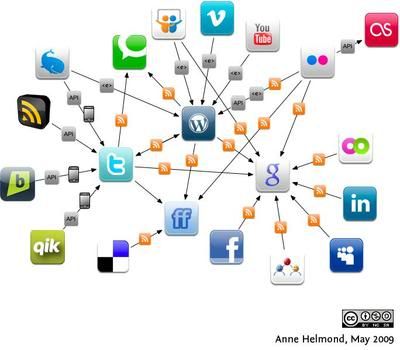Social networks: Connecting internal employees
 “If you put 10 people in a meeting room and ask them to collaborate, they won’t come up with anything more creative than finding a way to kill one another in the parking lot.”
“If you put 10 people in a meeting room and ask them to collaborate, they won’t come up with anything more creative than finding a way to kill one another in the parking lot.”
In her article The Power of Social Collaboration for Work, Anita Bruzzese quotes the above in reference to the many jokes that surround offices about people’s inabilities to work together.
The rise of social networks has helped companies overcome the challenges of collaboration, communication, and ideation.
As Bruzzeze explains, “Instead of meeting once a week in a room to snipe with colleagues about a project’s progress, you can simply post new updates and ideas to a wiki and don’t have to deal with messy office politics or prima donna personalities. Instead of fruitless hours spent trying to gain new insight from cubicle mates, you post a question on Twitter or LinkedIn and are rewarded with dynamic solutions and new ideas, often within minutes.”
Social networks connect companies and customers
60 percent of people who use three or more digital means of research for product purchases learned about a specific brand or retailer from a social networking site. (Nielsen – Social Media Report Q3)
Companies are increasingly learning how to use social networks to market their brands and to promote better customer service. Social customer service is advantageous to both sides. Companies can take advantage of free marketing. If a customer likes a particular brand, all they need to do is type in a few characters into their social network statuses to tell all their friends about it.
Social networks help companies reach customers “where they live,” and obtain new insight about their brands. Many companies don’t realize how powerful this is. Dubbed as “one of the most social companies” by Business Insider, Dell is able to monitor 22 000 daily posts on social networks about them. They take total advantage of social networks to identify issues with their brand and products in order to proactively solve customer support issues. They analyze their industry’s social stream to stay informed of competitor impact and activities.
Social networks connect customer service to all departments
Social networks help tie customer service to other functions across their organization. Recognizing this, more and more business technologies are integrating with social networks. Software like OneDesk does this so that comments from the social web get to the right department. For example, Issues can be brought into OneDesk’s case management application to be worked on by support teams.Or, ideas can be moved to the ideas management application and worked on by marketing or innovation leaders. Learn more about OneDesk’s social media monitoring tool by vising the links below.